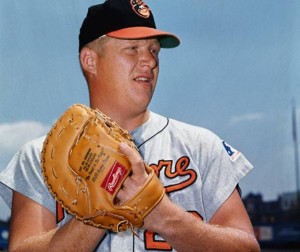Happy 70th Birthday Boog Powell! 4
The Baltimore Orioles of the 1960s and early 1970s boasted a roster busting with stars from top to bottom. While Brooks and Frank Robinson were the two best players on the team, the most imposing figure was a 6-foot-4, 240 pound first baseman who hit towering home runs and picked throws out of the dirt with ease. It was that player, Boog Powell, who became a favorite to many young fans, including myself.
It is hard to believe that today is the 70th birthday for one of the great sluggers of his era and we at Sports Then and Now want to wish a Happy Birthday to one of our all-time favorite players.
Given the super-sizing of professional baseball players in recent years, Powell’s size may no longer seem all that special, but in the 1960s and 1970 when most players were shaped like string beans, Powell was hard to miss. With tree trunks for arms that looked even larger when wearing the Orioles tight fitting gray uniform top, he spent more than a decade launching mammoth home runs and playing first base for the Baltimore Orioles.
A fair-skinned giant with reddish hair, Powell looked like a farm boy from the Midwest, but actually was born in Lakeland, Florida and grew up in the Sunshine State. Though his given name was John Wesley Powell, he earned the nickname “Boog” as a kid due to his mischievous nature. He seemed to always be getting into something and became known as Booger, as in, “What’s that little Booger doing now?” The nickname was eventually shortened to Boog, probably around the time he got big enough to beat the snot out of anyone who would dare call him Booger.
Powell’s prowess on the baseball field was evident from an early age. In 1954 he was part of the Lakeland Little League squad that played in the Little League World Series in Williamsport, Pennsylvania.
Signed as a free agent by the Baltimore Orioles in 1959, Powell quickly made his way to the majors. He led the International League in home runs in 1961 and made his major league debut that September.
The next season he became the starting leftfielder for the Birds and was an important reason the Orioles were steadily moving from perennial doormat to contender in the American League. Powell blasted 25 home runs in 1963 and the following season hit 39 homers and led the American League with a .606 slugging percentage despite missing several weeks with a broken wrist. Read the rest of this entry →




